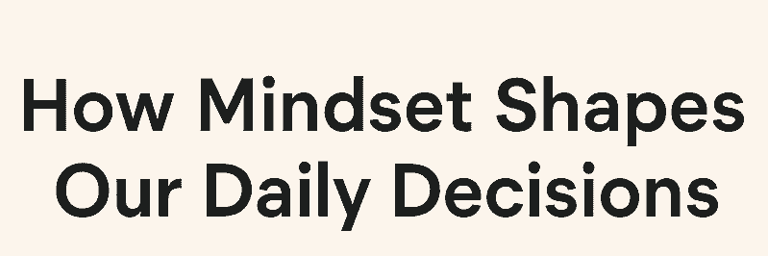Mindset Matters: Fixed vs. Growth Mindset
Discover how your mindset shapes everyday decisions. Learn the differences between fixed and growth mindset and their impact on your choices, habits, and personal success. Unlock your potential for self-improvement today!


How Mindset Shapes Our Daily Decisions
Every single day, we’re confronted with a multitude of choices—what to eat, how to spend our time, how to react to difficult situations, and which opportunities to chase or ignore. What drives these decisions often goes beyond logic, circumstance, or even habit. At the core of nearly all our choices lies a powerful force: our mindset.
What Is Mindset?
The beliefs, attitudes, and assumptions we hold regarding ourselves and the world shaped our mindset. It’s our internal lens, coloring how we perceive life, influencing judgments, and guiding our decisions.
Psychologist Carol Dweck identified two main mindsets:
Fixed Mindset: The belief that abilities and intelligence are static and unchangeable.
A growth mindset holds that hard work and commitment can improve abilities and intelligence.
But your way of thinking includes more than just those two aspects; it also involves your overall attitude, whether you’re positive or negative, believe there is plenty or not enough, and whether you take action or just react. Each of these mental orientations subtly steers our daily actions.
Decisions start with perception.
Mindset shapes how we perceive opportunities and challenges. Two people can face the same situation and interpret it entirely differently depending on their mental framework. For example:
A person with a scarcity mindset might see competition as a threat.
Someone with an abundance mindset might view the same competition as a motivation for growth.
This initial interpretation creates an emotional response, which heavily colors the next steps—whether to act boldly, hesitate, or withdraw entirely.
Micro-Decisions, Macro Impact
It’s easy to think that mindset only affects big, life-altering decisions like choosing a career or starting a business. But mindset is equally influential in small, everyday choices—like whether to get up early for a workout, how we speak to our coworkers, or whether we face a discomforting truth head-on.
These micro-decisions accumulate over time, forming habits. Our habits largely determine the course of our lives. Your daily decisions become your destiny—and your mindset sits at the control panel.
Emotional Control and Response
Our mindset also determines how we respond to emotions, especially under stress or disappointment.
A reactive mindset, for instance, might cause someone to lash out when criticized.
A reflective mindset enables a pause—a moment to evaluate feedback and respond constructively.
Over time, this difference compounds. The reactive individual might burn bridges and erode self-confidence, while the reflective one builds resilience, emotional intelligence, and stronger relationships.
Risk, Fear, and Self-Talk
Mindset influences how much risk we’re willing to take and how we handle fear. Someone with a growth mindset may see fear as a sign they’re expanding their comfort zone. Meanwhile, someone locked in a fixed mindset might interpret fear as a signal to retreat.
What underpins this is self-talk—the internal narrative running in our minds throughout the day. If that voice is judgmental, self-critical, or filled with doubt, it will sway our decisions toward playing small. On the other hand, an encouraging inner dialogue can empower us to pursue goals with greater confidence.
Mindset and Decision Fatigue
Modern life bombards us with choices, and not all of them are significant—what to wear, what to eat, which app to open next. A continuous stream of choices results in decision fatigue, reducing our capacity for effective decision-making throughout the day.
A strong, intentional mindset helps combat this. It offers a framework for filtering out distractions and aligning choices with our core values. For example, someone who has a mindset grounded in discipline may rely on routines and automation to reduce unnecessary choices, conserving willpower for bigger decisions.
Shifting Your Mindset
The most empowering truth? Mindsets are changeable. It’s not a personality trait or genetic inheritance—it’s a choice we can consciously develop.
Here are a few ways to shift your mindset for better decision-making:
Practice Awareness: Notice your habitual thoughts, especially in moments of stress or uncertainty.
Challenge Limiting Beliefs: When you catch a self-defeating thought, ask yourself, “Is this really true?”
Use Affirmations and Visualization: Train your mind to focus on possibility and progress.
Surround Yourself with Growth-Oriented People: Environment matters. Seek those who reflect the mindset you aspire to.
Celebrate Small Wins: Every right decision, no matter how small, reinforces the mindset you’re building.
Final Thoughts
Mindset is the silent architect behind our everyday choices. Whether it’s deciding to speak up in a meeting, stick to a healthy habit, or take a bold leap into the unknown—it all starts with how we think. By cultivating a mindset rooted in growth, awareness, and empowerment, we make decisions that align with our highest potential.
So the next time you face a simple or complex decision, pause and ask yourself—not only what you should do, but also who is the decision-maker. Because the mindset behind the choice can matter more than the choice itself.

